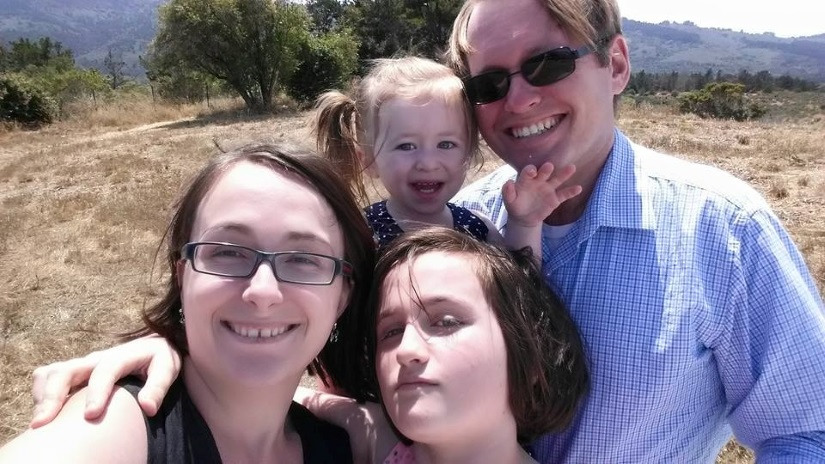September 1, 2017 | Erin Bluvas, bluvase@sc.edu
Jack Reeves and his family have persevered through challenges that would stop most of us in our tracks. The second-year health services policy and management (HSPM) doctoral student is a disabled veteran and his two daughters both face major health challenges, but that hasn’t stopped Reeves and his wife from pushing onward to do what’s best for their family and for the world.
“You see, this isn’t about me at all—this is about we,” Reeves says of his commitment to improving health on a broader scale. “I chose public health because this global community I am a part of needs someone within the health policy sphere who can carry their standards, address their needs, and conduct research to aid in the creation of effective solutions.”
The Sacramento, Calif., native got his first taste of international health issues when he joined the U.S. Air Force in 1997. As a senior airman, Reeves spent four years gaining a global perspective and experiencing health challenges on a personal level.
You see, this isn’t about me at all—this is about we.
-Jack Reeves, HSPM Ph.D. Student
After studying various subjects at local colleges and earning two associates degrees in the process, Reeves continued on to complete a bachelor’s degree in government followed by a master of public policy and administration from California State University,.
During this time, Reeves worked in the California State Senate and Assembly as a health staffer, researching, drafting language, and rallying support from the professional community for a bill (AB 1592) related to the state’s diabetes program—work that ultimately resulted in Reeves being honored with Assembly Member Resolution 1096 in 2014. He also served as a consultant for Yolo County on a project related to homelessness in the local community.
“You don’t need a professional public health background to study public health policy,” says Reeves. “Public health research benefits from having an academically and experientially diverse base to draw from. Your story and experiences are unique and bring fresh perspective to a problem which others may not share.”
After his 2016 graduation from his master’s program, Reeves was eager to begin a doctoral program with faculty whose research interests aligned closely with his own. UofSC fit the bill and seemed to be a great option for Reeves and his family.
“As a disabled veteran on a limited income, Columbia’s mix of affordability, diverse cultural offerings, and excellent educational and professional opportunities made it the best choice for us,” says Reeves.
Though the university and surrounding area appeared to be an excellent choice on paper, Reeves and his wife’s expectations were surpassed by the community family they actually discovered. Diagnosed with Type 1 Diabetes at the age of 4, Reeves’ older daughter, Emmy, is allergic to the preservatives found in all insulins available in the market and recently relocated with Reeves’ wife to Minneapolis for a pancreas transplant. Barring complications, he expects to welcome his wife and daughter home by the end of the year (follow her journey here).
Meanwhile, Reeves and their younger daughter, who faces congenital health issues, are holding down the fort with a little help from their friends. In their short time in the Columbia area, the Reeves family has developed a robust support system, complete with faculty who are flexible and friends who will help care for their younger daughter while Reeves continues his doctoral studies.
As a disabled veteran on a limited income, Columbia’s mix of affordability, diverse cultural offerings, and excellent educational and professional opportunities made it the best choice for us.
-Jack Reeves, HSPM Ph.D. Student
“I do this with the full support of my family and friends,” Reeves says. “My wife has stated specifically that she thinks it’s in our family’s and community’s best interest to carry on and push for on-time completion of my doctorate.”
Reeves’ interests are numerous and varied, including cancer, child health and mental health. He is also interested in how policy affects the delivery of health care and health outcomes. As he explores these areas through his doctoral program, Reeves is also taking steps to prepare for his future career in state or federal public health. In addition to preparing manuscripts for publication in peer-reviewed journals, he is currently preparing to present at multiple academic conferences.
On the practical side, Reeves has been gaining experience through graduate assistantships with his department and the Arnold school’s Core for Applied Research and Evaluation. He is also serving as a policy and action associate for the American Public Health Association and will begin a two-year term on the same organization’s Governing Council this fall.
The Norman J. Arnold Doctoral Fellow has already developed relationships with mentors in his department as well. Research assistant professor Ibrahim Demir sparked his interest in teaching quantitative methods—something that Reeves would like to pursue during his remaining time at the Arnold School. He credits assistant professor Zaina Qureshi for helping him understand qualitative methodology and appreciate the benefits of constructive criticism.
Clinical assistant professor Kelli Kenison helped illuminate the value of the evaluation process of health policy for Reeves. “She’s also been very supportive as my family goes through some trying times,” he says. “Her support has been invaluable in helping me balance everything.”
Reeves and his family have determined the best way to express their appreciation for the immense support they have received from the academic and local community during this critical time...To persevere through Reeves’ doctoral program so he can give back as a public health professional.
“I do this for them; I do this for all of us in the global community,” he says. “I have a lot riding on this.”
